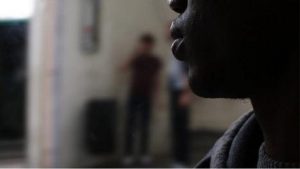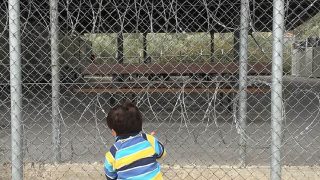
When Sébastien D., a 17-year-old Cameroonian boy, arrived in Paris at the end of July, he sought help from the Paris child protection system, hoping for placement with a foster family or in a shelter. Instead, after one night in temporary accommodation, he has been spending his nights in the Place de la République.
“To sleep, you look for a corner, you lay down a piece of cardboard. If you find an older gentleman, he might give you a blanket. Because at night it can be very cold,” he said.
He’s sleeping on the streets because entering the child protection system isn’t a straightforward process for unaccompanied migrant children. Like many migrant children, Sébastien didn’t have a copy of his birth certificate with him. He should have had the opportunity to establish his age through a comprehensive interview and an evaluation by a multidisciplinary team. Instead, he faced a truncated process in which an examiner rattled through a series of questions without explanation and then told him to return the following day to pick up the official notice that he’d been denied formal recognition as a minor.
Sébastien’s letter looks like many others we’ve seen during our review of age assessment procedures in Paris—it’s based on grounds that appear to be arbitrary.
His lack of identity documents counted against him, even though many children lose their documents during their journeys, and even though French procedures anticipate this reality. In other cases, on the other hand, many of the decisions we examined dismissed birth certificates and other identity documents, even if authenticated by embassies or courts in the country of origin.
Working during the journey, as Sébastien did, or taking the decision to travel alone was also frequently taken as evidence of adulthood, even though many children around the world travel unaccompanied and many more work, as Human Rights Watch has repeatedly documented.
Detailed accounts can be rejected as a sign of maturity. Imprecise accounts, particularly those with trivial errors with dates, also frequently count against children.
And many of the denial letters we reviewed rely on examiners’ assessment of posture or comportment to conclude that a youth is not under the age of 18. This criterion is purely subjective—when we asked how it is assessed, officials we met with conceded there was no validated instrument or other objective basis for assessing age through comportment.
Even getting through the door of the center where their age is verified and needs assessed can be a challenge. Between February and May, my colleagues and I spoke to many children who said they had been turned away by security guards at the evaluation center (Dispositif d’evaluation des mineurs isolés étrangers, DEMIE), run by the French Red Cross under an agreement with the department of Paris.
In a typical example, a 17-year-old told us he saw a guard turn another youth away at the door with the words, “You, get out, you, you’re not a kid!” Aid workers told us they frequently witnessed similar summary rejections, which appeared to be based on guards’ assessment of youths’ appearance.
Many children told me they received very brief evaluations of five to ten minutes. At the end of these “flash” interviews, an official tells them they’ve been rejected and hands out a leaflet with the address of the juvenile judge, saying they can get their cases reviewed there.
In fact, they can’t, not without a written decision. “The kids end up going back and forth between the DEMIE and the court,” a volunteer with Utopia 56 told me.
That’s what happened to Youssouf—he was rejected after a seven-minute interview and sent away with nothing in writing. When we spoke he was still trying to get the paperwork he needed to take his case to the judge.
Officials with the Paris City Hall told us at the end of June that they took steps at the beginning of May to ensure that all children receive formal decisions in writing when they’re seen at the DEMIE. This new instruction is a step in the right direction. But it doesn’t seem to be universally applied. In late May, we saw children enter the DEMIE and leave ten minutes later, explaining that they had been refused, with no formal decision, after they answered a few questions. Children we spoke to this month report that they’ve received written decisions, in most cases the day after they went through an abbreviated interview, at the end of which the examiner told them he did not believe they were not under age 18.
In the cases we reviewed, even when children did receive written decisions, denials were often taken on grounds that appear to be arbitrary.
It’s possible to seek review of negative age assessments from the juvenile court. Children who go to court win about 60 percent of the time, Catherine Delanoë-Daoud, a lawyer who heads the Paris Bar’s initiative to address the needs of unaccompanied children, told Le Figaro.
But some judges regularly order medically dubious bone tests to determine age. The judges who rely on these tests do so despite their wide margin of error for adolescents, and against the recommendations of the National Academy of Medicine, the High Council of Public Health (Haut Conseil de la Santé Publique), and the National Consultative Committee on Ethics for Health and Life Sciences (Comité consultatif national d’éthique pour les sciences de la vie et de la santé).
A night manager with Utopia 56, which provides information and humanitarian assistance to refugees and migrants, summed up the system in Paris: “It’s like a lottery: sometimes you win, but most of the time you lose, even if you’re underage.”
That description is accurate, with one clarification—unlike most lotteries, the stakes are high. Youths must fend for themselves while their cases are considered. In February, 400 or more unaccompanied migrant children were sleeping on the streets of Paris, according to estimates by lawyers and aid groups. In June, estimates were lower, in the range of 200—but still far too many.
City Hall officials and the French Red Cross reacted to our report by rejecting our findings, claiming that they follow proper procedures in every case. That’s not a credible claim—the patterns we saw in the interviews and case files we reviewed are consistent with numerous accounts of lawyers and nongovernmental associations, as well as findings from the French Defender of Rights.
Paris can and should do better. To start, child welfare authorities should ensure that age assessments are done with the care required by French law, and that nobody is refused recognition as a child on arbitrary, capricious, or spurious grounds.
Child protection should not be a lottery.
Human Rights Watch.Protection of Migrant Children: the Shameful Parisian Lottery. © 2018 by Human Rights Watch.


